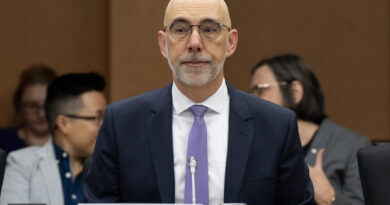Bangladesh’s Interim Leader is a Nobel Peace Prize Winner
Nobel prize-winning economist Muhammad Yunus has been sworn in as the head of Bangladesh’s government following the resignation of Sheikh Hasina Rahman amidst protests.
An economist honored with the Nobel Peace Prize has taken on the role of interim chief adviser of Bangladesh after the military assumed control amid violent demonstrations against Prime Minister Sheikh Hasina Rahman’s government.
As the chief adviser, he now serves as the temporary head of the interim government.
The 76-year-old leader of the Awami League, the longest-serving female head of government, was re-elected for a fourth consecutive term in a January election that the main opposition party boycotted.
Yunus arrived at Dhaka’s Hazrat Shahjalal International Airport on Thursday from Paris and was subsequently inaugurated as the chief of the caretaker government.
The seasoned economist, who had been receiving medical treatment in France, was called back to lead the nation by Gen. Waker-uz-Zaman, the chief of Bangladesh’s army staff.
Yunus Speaks Sees ‘Very Beautiful Nation’
Yunus stated to reporters at the airport, “The country has the potential to become a very beautiful nation.”
“We will march forward following the path shown by our students,” he remarked, referring to the numerous university students who spearheaded the protests against Rahman’s administration.
The protests initially started as a reaction to the implementation of job quotas in the government.
Rahman’s government had specified that 30 percent of government positions had to be allocated to relatives of veterans from the country’s independence war in 1971.
Several student leaders who led the rebellion against Rahman were present at the airport to greet Yunus, who mentioned that his top priority was to restore order.

“Bangladesh is a unified family,” Yunus declared. “We must come together and harness its vast potential.”
“Violence is our adversary. Please refrain from escalating conflicts. Stay composed and prepare to rebuild the nation.”
Prior to his departure from Paris, Yunus was asked about the timing of upcoming elections, to which he responded that it was too premature to speculate.
Originally named East Pakistan, Bangladesh was established by the British as a sanctuary for India’s Muslims after granting independence to the South Asian sub-continent in 1947 and dividing it between Hindus and Muslims.
However, Bengali-speaking East Pakistan rejected the dominance of Urdu-speaking West Pakistan, leading to a civil war in 1971 that lasted eight months and resulted in atrocities and numerous deaths.
Rahman’s father, Mujibur Rahman, was a co-founder of the Awami League and hailed as the “father of the nation.” He was assassinated in 1975.
The Awami League and the Bangladesh Nationalist Party, its rival, have been fierce adversaries for much of the past five decades.
The head of the Bangladesh Nationalist Party and former prime minister, 78-year-old Khaleda Zia—whose husband, Ziaur Rahman, was assassinated in 1981 during a separate coup—was imprisoned in 2018 on corruption charges but has since been released.
Reaction to Jobs Quotas
Bangladesh, home to 170 million individuals, has a thriving garment sector but also a large number of unemployed university students, who have been at the forefront of the protests.
Rahman’s administration had rescinded most of the government job quotas, but by that point, the protests had evolved into a broader call for change against what was perceived as an authoritarian regime.
Responding to the issues surrounding job quotas, Rahman’s son, Sajeeb Wazed Joy, emphasized the necessity for the Awami League to partake in the forthcoming democratic process.
“The Awami League, the oldest, largest, and democratic party in Bangladesh, must play a role in the democratic process going forward,” he stated in a social media post.
“The Awami League lives on… It is impossible to eradicate the Awami League,” Joy insisted. “We had planned for our family to disengage from politics. However, in light of the attacks on our leaders and activists, we cannot sit idly by.”
AP and Reuters contributed to this report.





